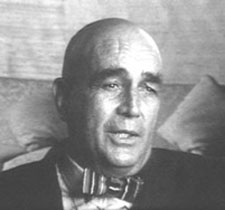Collection number: MC 243
Size: 1 box
(.33 cu.ft.)
About William Loeb III
William Loeb III (1905-1981) was born on December 26, 1905 to William Loeb Jr. (1866-1937) and Katharine Loeb (nee Dorr). His father, William Loeb Jr., served as assistant secretary to the president from 1901-1903 and then executive assistant to the president under Theodore Roosevelt from 1903-1909. The two families were close, and when William Loeb III was born, Edith and Theodore Roosevelt became his godparents. From this association William III had a continued relationship with Teddy Roosevelt’s family through adulthood, especially his wife, Edith Roosevelt and his son, Archibald Roosevelt.
As an adult, Loeb led a complicated personal life, with three marriages and several prominent and often overlapping extramarital affairs. All but the first of these relationships had a direct impact on the funding of his newspapers. Additionally, he had an increasingly acrimonious relationship with his mother, especially after she discovered that Loeb had taken $250,000 in securities without her knowledge and used them as collateral to purchase controlling interest in the Manchester Union Leader (New Hampshire) in 1949. She in turn filed a lawsuit for $1,000,000 of the paper’s stock, which they later settled out of court.
Professionally Loeb was known as a provocative, conservative newspaper editor. On October 25, 1941 Loeb bought his first paper, the St. Albans Messenger (Vermont), with $40,000 borrowed from his mother, in spite of having very little experience as a journalist. He went on to own papers in Connecticut and Massachusetts, but his most notable impact was on the New Hampshire press where he was editor of the Manchester Union Leader, the only daily paper distributed statewide in New Hampshire. New Hampshire’s position as the “first in the nation” primary and Loeb’s control over local publishing interests via the Manchester Union Leader made him a surprisingly significant force in shaping state and national politics, which he leveraged by expressing his opinions in bold front page editorials.
As a highly polarizing figure with influence over politics, Loeb instigated many high profile alliances and feuds throughout his career. In many cases, feuds occurred when alliances failed, did not necessarily fall along party lines, and often benefited those who funded his newspaper interests. For instance, Loeb initially supported then Senator John F. Kennedy, writing a front page editorial entitled “Modern Day Paul Revere” in which he applauded the senator for his position on national defense. It was, however, a time during which Loeb was pursuing funding for his Manchester newspapers from Ambassador Joseph P. Kennedy. After his meeting with the elder Kennedy did not produce an agreement where his papers received funding but Loeb maintained controlling interest, he turned his editorials soundly against the entire Kennedy family, calling John F. Kennedy “The no. 1 liar in the United States” shortly after his inauguration. Loeb at one time or another writes editorials attacking most of the U.S. Presidents, regardless of party, elected during his tenure, including Harry S. Truman, Dwight D. Eisenhower, Gerald Ford, and Jimmy Carter. Though generally approving towards Richard Nixon, he was highly critical of his National Security Advisor and Secretary of State, Henry Kissinger.
Interestingly, in spite of being anti-labor in regards to his own business, he went from critic to supporter of Jimmy Hoffa, after one of his advisors retired and sold his stock in the Union Leader Corporation to the Central States, Southwest, Southeast Area Pension Fund of the Teamsters Union. Loeb would then continue to support Hoffa, even after his conviction and imprisonment in 1967.
About the William Loeb III Papers
The William Loeb III Papers, 1957-1968 is comprised mostly of correspondence to William Loeb III from personal friends, business and political contacts, prepublication article submissions, and newspaper readers responding to his editorials. Many of these correspondents included clipped articles or photos with their letters. These papers also include several dictated phone conversations as well as pamphlets, copies of congressional records, 4 pieces of political ephemera, a returned membership form from the Harvard Club (includes a recommendation by Archibald B. Roosevelt), a booklet and a subpoena.
Notable correspondents that can be found in these papers include: H. J. Gibbons (International Brotherhood of Teamsters, Executive Assistant), U.S. Representative Robert W. Hemphill, Roger H. Ferger (president and publisher of the Cincinnati Enquirer), U. S. Representative Thomas W. Miller, Edith Kermit Roosevelt, U.S. Representative Clarence J. Brown, Sr., Archibald B. Roosevelt, New Hampshire Senate Minority Leader Louis I. Martel, Alabama Sheriff James G. Clark, Jr., Fred C. Koch, U.S. Senator Norris H. Cotton, and Major General Sir Francis DeGuingand.
Prominent topics discussed include: opposition to civil rights, Communism, the Republican Party and its candidates, the nature of conservative politics in the 1950s and 1960s, national defense, Teddy Kennedy, and Jimmy Hoffa.
Administrative Information
Access Restrictions
This collection is open.
Copyright Notice
Contents of this collection are governed by U.S. copyright law. For questions about publication or reproduction rights, contact Special Collections staff.
Preferred Citation
[Identification of item], William Loeb III Papers , 1957-1968, MC 243, Milne Special Collections and Archives, University of New Hampshire Library, Durham, NH, USA.
Acquisitions Information
Purchase: DeWolfe & Wood, December 2, 2011 (Accession number: 2012.03)
Related Material
Additional correspondence and newspaper clippings may be found in the Paper[s] of Charles W. Tobey, held at the Rauner Special Collections Library, Dartmouth College.
Collection Contents
| Box 1 | ||
|---|---|---|
| Box 1, Folder 1 | Papers, 1957-1959 | |
| Box 1, Folder 2 | Papers, 1960-1961 | |
| Box 1, Folder 3 | Papers, 1962 | |
| Box 1, Folder 4 | Papers, 1963 | |
| Box 1, Folder 5 | Papers, 1964-1965 | |
| Box 1, Folder 6 | Papers, 1966-1968 | |
| Box 1, Folder 7 | Papers, undated | |

